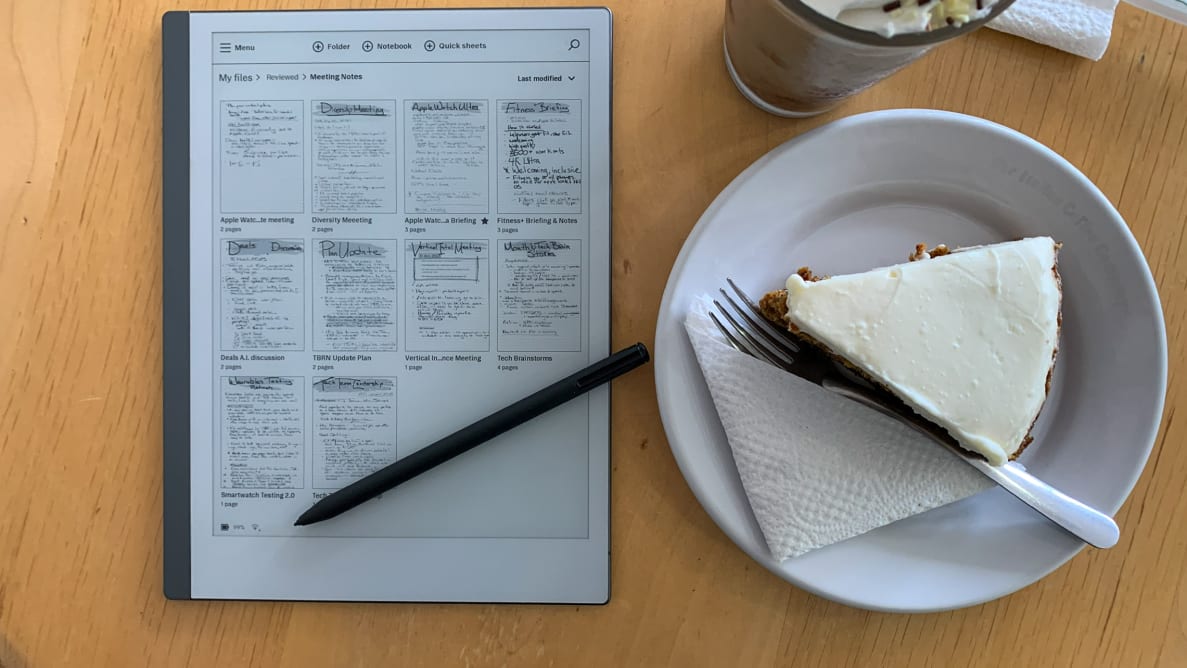Pros
-
Large, light and solidly built
-
Offers a superior digital note-taking experience
-
Allows for e-book and PDF annotations
Cons
-
No front lighting
-
Limited file compatibility
-
Slow cloud service sync speed
About the reMarkable 2
reMarkable 2 specs
- Price: $299 (new). $279 (refurbished)
- Dimensions: 7.4 x 9.6 x 0.19 inches
- Weight: 0.89 lb
- Display Size: 10.3 inches
- Screen resolution: 226 PPI
- Storage: 8GB
- Waterproof: No
- Supported File Formats: PDF and ePUB
- Accessories: 9x extra marker tips (included). Folio, Book Folio, Type Folio, reMarkable Marker, or Marker Plus all sold separately
- Special features: Optional Connect subscription
- Satisfaction guarantee: Free return and full refund within 100 days of the delivery date.
The reMarkable 2 is the world’s thinnest tablet (at the time of writing this review), and also an E-Ink writing tablet designed to emulate putting pen to paper. It also works as a barebones word processor with the optional $199 Type Folio, which occasionally goes on sale for $50 off.
With no speakers, color display, full-fledged operating system, or massive battery to help it power its way through a full day of work, its slim profile isn’t the massive feat that it’s made out to be. However, its svelte feel and, that it weighs less than a pound, make it a pleasure to cradle in the crook of your arm or hold, one-handed, as you write on it.
What we like
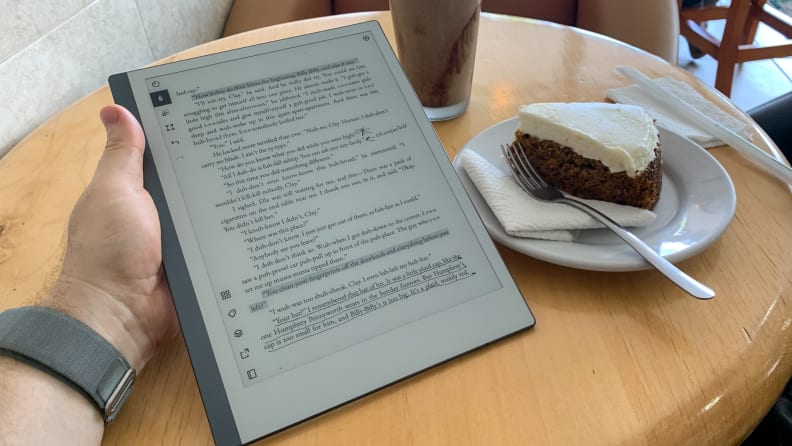
The reMarkable 2 is incredibly thin and light, yet feels solid enough to take some abuse.
Paper-like writing
I’ve used all kinds of tablets for over the past 15 years, and yet it’s still incredibly rare that I enjoy using a stylus to write on one, even 2-in-1 laptops; their display surfaces are often too smooth to simulate the feeling of setting pen to paper. And most styluses, whether they come with the device or not, feel like you’re holding a cheap chunk of plastic while writing with a mushed-up rubber tip.
But the reMarkable 2’s engineers absolutely nailed what it feels like to write on a sheet of paper. Does scribbling out a sentence on this tablet feel as good as it does when I do the same in my Midori Travelers Notebook with my favorite fountain pen? Of course not. But the experience is close enough that I’ve spent close to a year and a half using the reMarkable 2 for notetaking and writing rough drafts of many of my reviews, including this one.
Much of the tablet’s success at emulating the feel of paper comes from the texture of the glass face that protects its low-latency Canvas display. The glass’ texture replicates the resistance of dragging the tip of a pen or pencil across a piece of paper.
In my years of using the reMarkable 2, I’ve noted almost no input latency, when writing, drawing, or, erasing content from its display. (ReMarkable boasts 21ms of input latency.) Without this combination of tactile feedback and the near-instant response, the reMarkable 2 wouldn’t have been a success.
Thoughtful interface
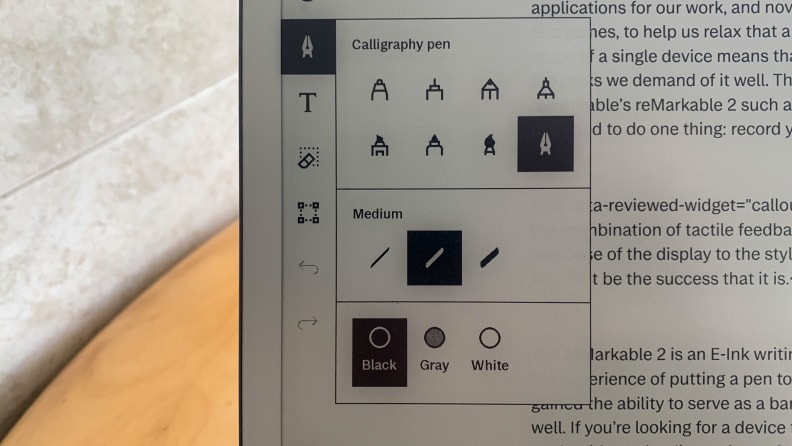
writers and artists will find no shortage of digital tools to use to create their notes and images on the reMarkable 2.
Over the past year, the reMarkable 2’s proprietary Linux OS has done a lot of growing up. Turning on the tablet for the first time quickly guides you through its setup, some basic preferences, and where to find all its various writing tools. The tablet allows the stylus to emulate a pencil, fine-line pen, marker, highlighter, and fountain pen.
With the ability to register thousands of different levels of pressure, there’s no limit to the amount of personalization you’ll find in your writing or drawing. The tablet’s OS also allows users to cut and paste large sections of work or erase it completely from the display, making it easy to organize or clear the page you’re working on.
Speaking of the page, there’s no shortage of templates to work with. Need some ruled lines for taking meeting notes? A checklist for chores? How about a storyboard template or one to help you draw a city street from the correct perspective? You’ll find them, along with dozens more, waiting to be used.
What’s more, while you’re able to flip through pages as you would with a paper notebook, you can still use the same touch gestures as a traditional tablet. Scroll and write on the same page, as long as you like, pinch and zoom or shift the page to one side or another to fit in a little more information. The interface is designed to work the way you need it to. This extends to the tablet’s customizable file system, which allows you to create nested folders to keep things organized.
In addition to creating original notes, this tablet can also be used to markup PDFs and unprotected ePub files–a great asset in an office or academic environment. There’s also a rudimentary e-book reader baked into the reMarkable’s operating system, but it’s not great. If you want to read more than you write, you’re better off with a device like Amazon’s Kindle Scribe.
Focused word processing
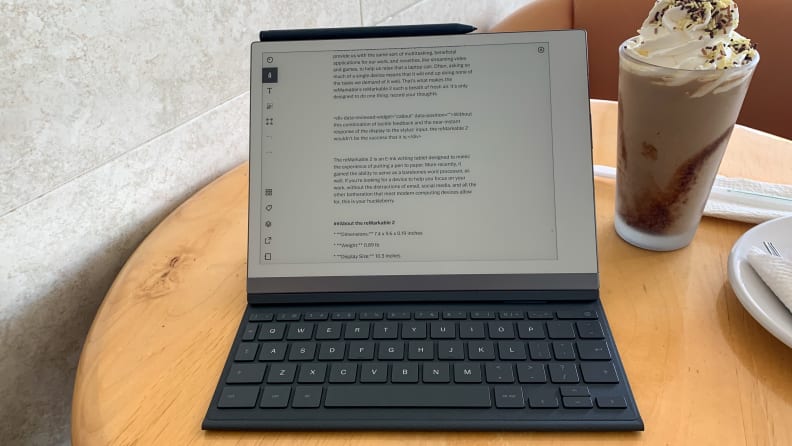
The reMarkable 2's Keyboard Folio turns this focused writing device into a focused word processing machine.
reMarkable 2 users have had the ability to transform their handwritten notes into typed passages, through the magic of Ocular Text Recognition (OCR), for some time now. It works pretty well, provided your handwriting is clear and concise. The tablet also has an on-screen keyboard you can call up for certain tasks, like labeling a new Notebook or Quicksheet. It can also be used to type notes, but its input response time, especially for a touch-typist, is slow enough to gum up the works. I don’t recommend it.
However, I do recommend this tablet’s aforementioned $199 Keyboard Folio. While it adds some heft to the reMarkable 2, I found the keys to be well-spaced and, for the most part, around the same size the same as those on my Surface Pro 7+ (although the number row keys were narrowed to fit into the folio’s folding design). The keyboard attaches magnetically to the tablet and is powered by a set of pogo pins built into the back of the device.
If you’re someone like me who finds email, Slack messages, and social media to be a siren call that lures you away from whatever work you’re trying to focus on, being able to type up a report—or a review like this one—on a distraction-free device is a productivity boost of the first order. And referencing your hand-written notes on the same page that you’re typing on? All the better.
That said, neither the Type Folio nor the device’s Book Folio case provides it with more than basic protection from bumps and dings. If you drop your reMarkable 2, the magnets that bind it to its case won’t be strong enough to keep it from popping out onto the floor. If you favor protection over utility, reMarkable’s pocket-style Folio might be the best bet.
Long battery life
Thanks to the reMarkable 2 having far more in common with a Kindle Paperwhite than an iPad Air, its battery life can be measured in days as opposed to hours.
ReMarkable claims that the device can go for two weeks before you’ll need to top-off its battery. Having used its tablet daily for meeting notes, calendars, to-do lists, and writing drafts, I can’t say that I’ve ever had it last this long, especially with its Wi-Fi connection turned on so it can sync to the cloud. If you’re a regular, heavy user of this device, expect somewhere between seven to ten days of frequent use before you need to plug it into a USB-C power source.
What we don’t like
Pay to play
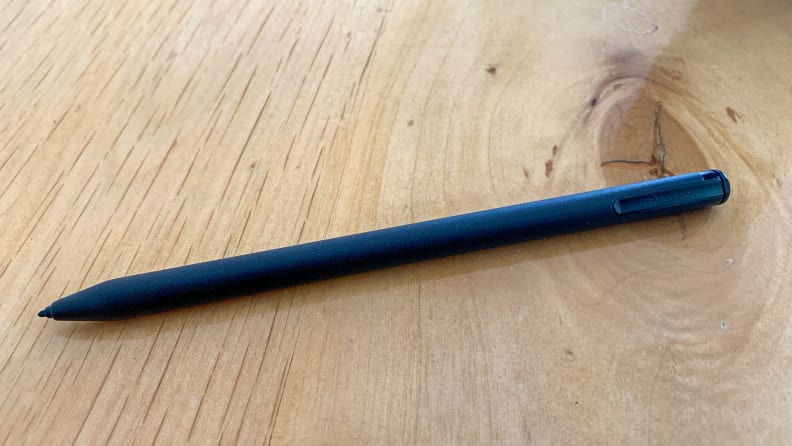
reMarkable offers two different writing implements to use with this tablet. You'll have to buy one of them if you want to put the reMarkable 2 to use.
When you buy a reMarkable 2, you’ll receive a year of free access to reMarkable’s Connect service. Connect provides unlimited cloud storage for all of the notes, annotated PDFs, and ePub files you’ve ever worked on using your tablet. Considering the fact that the reMarkable 2 only comes with 8GB of onboard storage, it’s a valuable service.
Perhaps more important than the cloud backup is the fact that all of your content is automatically synced to your computer and mobile devices, via the free reMarkable app. Once the app is installed on your device, it allows you to work on your files, even while you’re away from your reMarkable 2. This makes the tablet a much more versatile tool.
After your first year of ownership, however, Connect will cost you. At the time that this guide was written, the price, per month of service, was $2.99.
That said, even without springing for a Connect subscription, there’s still plenty that you can do with your reMarkable tablet. It’s possible to integrate services like Dropbox or Google Drive with it, at no cost. And all of the device’s best tricks, including handwriting conversion, screen sharing during presentations, and the ability to send documents via email, still work like a charm.
Slow sync
If you’re a Connect subscriber, you’ll note that as soon as you close a document on your reMarkable 2, reMarkable’s cloud services will automatically upload to the cloud. Syncing is fast and easy when you’re dealing with one document. But if you haven’t used the reMarkable app on your mobile device or computer in a while? Boy, howdy, do you have a wait in front of you.
There have been times when I wanted to view a document on my computer using the app, but wasn’t able to as my files needed to sync first. In instances where I’ve had between five and ten documents, I’ve waited over an hour for a synchronization session between reMarkable’s servers and my devices to sort itself out… and then had to wait some more. This has happened on several occasions. It’s an issue I hope will be addressed in the future. I had assumed that this was a situation unique to me. But, having discussed it with another reMarkable 2 user on Reviewed’s tech team, senior editor Joanna Neilus, I discovered that she suffered the same syncing frustrations,
In the dark
A piece of paper doesn’t light up, and unfortunately, neither does the reMarkable 2. As I largely use this device during working hours or near a lamp, I don’t think it’s a big deal. But it could be a deal breaker for night owls or those planning on using it to read in bed.
I asked the hardware developer some time ago why this was; having a layer of lighting between the stylus and the digitizing layer adds to latency. Having used both the Amazon Kindle Scribe and the Kobo Elipsa 2e—both of which feature front lighting—I can say this is true.
However, for the majority of the time I tested these two devices, the amount of input latency I could detect while writing was so minute that I don’t believe the average user would notice it. There are exceptions to this, as I have experienced long delays drawing a line on the Kobo Elipsa 2e and the Amazon Scribe— but not the reMarkable 2.
Should you buy the reMarkable 2
Yes, if you’re passionate about distraction-free work
If your life revolves around taking handwritten or typed notes but using a typical tablet leaves you feeling unproductive, the reMarkable 2 is a great option. With its long-lasting battery, cloud integration, and laser-sharp focus on distraction-free writing, it’s a device that may well be able to keep your mind track and the project you’re working on, on schedule.

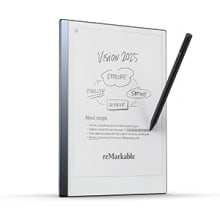
If you're looking at a tablet to help focus on productivity, the reMarkable 2 is what to get.
Meet the tester
Séamus Bellamy was a senior editor on Reviewed's Electronics Team. After returning to freelancing, he now writes for them. Before coming to Reviewed, his work was featured in The New York Times, The Globe & Mail, BBC World, Macworld, and Maximum PC.
Checking our work.
Our team is here to help you buy the best stuff and love what you own. Our writers, editors, and experts obsess over the products we cover to make sure you're confident and satisfied. Have a different opinion about something we recommend? Email us and we'll compare notes.
Shoot us an email